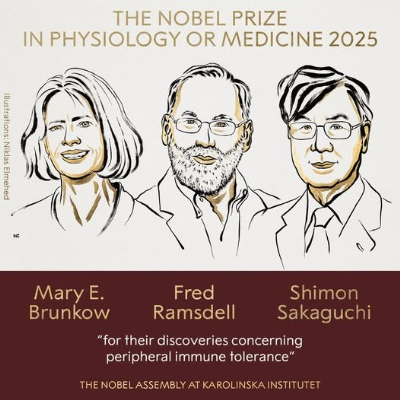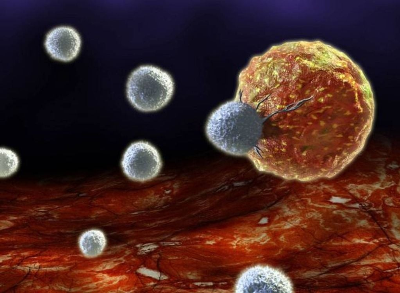
© Facebook Nobel Prize
Нобелівську премію з фізіології та медицини 2025 року отримали Мері Бранков (США), Фред Рамсделл (Великобританія) та Шимон Сакогучі (Японія). Згодом у їхніх офіційних профілях зазначено, що Мері Бранков працює в університетській медичній школі у Бостоні, Рамсделл — в імперському коледжі Лондона, а Сакогучі — в токійському науково-дослідному інституті імунології. Їхня спільна робота пролила світло на те, як імунна система не дозволяє собі зруйнувати власні тканини. Вони відкрили «регуляторні Т-клітини» (Tregs) — клітини, що запобігають надмірному спрацьовуванню імунітету, і довели ключову роль гена FoxP3 у їхньому дозріванні.У мишей мутації гена FoxP3 призводили до тяжких аутоімунних хвороб, що й дозволило ученим простежити механізми дії регуляторних Т-клітин у людей. Ці відкриття відкривають перспективи для нових методів лікування аутоімунних захворювань, покращення приживання трансплантатів та нових стратегій у онкології. Під час урочистого оголошення премії сталася цікава деталь — Фред Рамсделл перебував у віддаленій гірській місцевості, де не було мобільного зв’язку, і дізнався про нагороду значно пізніше, ніж отримали її інші лауреати.
Nobel Prize in Medicine 2025: How “Guardian Cells” Protect the Body from Attacking Itself
The 2025 Nobel Prize in Physiology or Medicine was awarded to Mary Brankov (USA), Fred Ramsdell (United Kingdom), and Shimon Sakaguchi (Japan). According to their official profiles, Mary Brankov works at a university medical school in Boston, Ramsdell at Imperial College London, and Sakaguchi at a leading immunology research institute in Tokyo. Their joint work shed light on how the immune system prevents itself from destroying the body’s own tissues. They discovered regulatory T cells (Tregs) — specialized cells that suppress excessive immune responses — and demonstrated the crucial role of the FoxP3 gene in their development. In mice, mutations in FoxP3 led to severe autoimmune disorders, allowing scientists to trace how regulatory T cells function in humans. These discoveries open up new perspectives for treating autoimmune diseases, improving transplant acceptance, and developing innovative strategies in oncology. During the official announcement of the prize, an unusual detail emerged — Fred Ramsdell was in a remote mountain area with no mobile connection and learned about the award much later than the other laureates.

©
1247